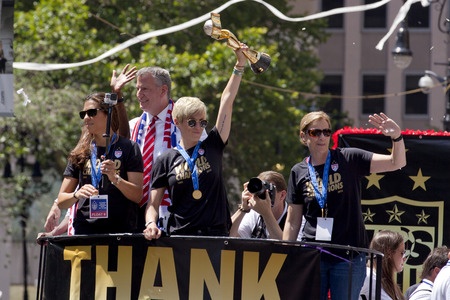
LGBT Athletes More Accepted Today
October 7, 2015
Imagine having a talent that would take you far in life. Now also imagine having something about your private life affect how far that talent would take you. This is how some of our LGBTQ athletes today feel.
Six-foot-three defensive lineman Esera Tuaolo, who played for the Green Bay Packers, felt this way. He was the best defensive lineman in the Pacific-10 Conference at Oregon State and was voted to the NFL’s all-rookie team in 1991.
Tuaolo soon stared drinking and becoming depressed. This was all because of the pressure of keeping his secret: Tuaolo is gay. Esera would use drinking to ease the pain. According to an ABC News Good Morning America interview, Tuaolo stated, “Many times, when driving 100 miles per hour, I felt as if I could turn that wheel and end it all.” Tuaolo came out in 2002, two years after retiring from pro football.
Megan Rapinoe plays for the Seattle Reign FC in the National Women’s Soccer League. As a midfielder, she played all six games in the 2011 World Cup. Rapinoe was also nominated to receive FIFA’s Golden Ball Award.
Rapinoe was very open when she came out in 2012. According to the article “Op-ed: Your Team Can’t Handle a Gay Player? Then Your Team Sucks,” Rapinoe states, “The more people who can come out in settings like the Olympics or other major sports where all eyes are on you, it helps with the breaking down of stereotypes. And that’s always a good thing.” Rapinoe is now engaged to her girlfriend, singer songwriter Sara Cahoone.
According to The Huffington Post, Eric Anderson, a professor at the University of Winchester, states, “We are currently in a wave of progress for gay rights.” He says that more and more gay athletes are coming out just before their careers begin.
One example is Jason Collins, a free-agent basketball player. Collins was unsure about coming out after he was signed because he feared the unwanted publicity and didn’t want his personal life to become much of a distraction.
Paul Dennis, a player development coach for the Toronto Maple Leafs, stated, “The younger players are incredibly more tolerant, they’re more liberal, they’re understanding, they’re accommodating, everything that they’re taught as youngsters to be accepting and respectful for not only their teammates but their opponents too.
“So that has trendsetted into respect and awareness and sensitivity towards others, regardless of their sexual identity,” Dennis continued. “And I think they’re coming into the league with that new attitude, and as a result, they’re far more accepting.”